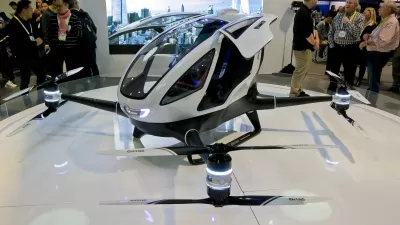A journalist asked, so Jarrett Walker answered.

Jarrett Walker, of Human Transit fame, has seen the recent buzz surrounding flying cars, flying taxis, passenger drones, and Uber Air. A journalist that goes unnamed asked for Walker's opinion on the subject. Here's what Walker had to say:
For every technology pitch, you must ask not just “what is this like from the inside?” but also “what is it like from the outside?” All vehicle technologies are sold based on how cool or useful it will be to ride them. And most of these pitches do not want you think about what it will be like to be outside of them, or to share a city with them.
The issues with flying taxis, cars, passenger drones, and on-demand helicopter services are obvious, according to Walker:
Even if they are much quieter than helicopters, they will introduce a new type level of noise to the city, anywhere near where they takeoff and land. Their presence overhead in any numbers will have physical and emotional effects on the population. They will introduce entirely new kinds of accidents that make everyone fearful of the space above them. And in the end, by allowing elites to opt out of the transportation problems that everybody else in the city is having, they will encourage elite disinterest in solving those problems.
Walker isn't the first to communicate skepticism about the new wave of transportation futurism. Matt Caywood, CEO of TransitScreen, wrote an op-ed over the summer that said cities would be better off planning for and investing in public transit than fancy airborne solutions to the problems of urban congestion.
FULL STORY: On Flying Cars

Trump Administration Could Effectively End Housing Voucher Program
Federal officials are eyeing major cuts to the Section 8 program that helps millions of low-income households pay rent.

Planetizen Federal Action Tracker
A weekly monitor of how Trump’s orders and actions are impacting planners and planning in America.

Ken Jennings Launches Transit Web Series
The Jeopardy champ wants you to ride public transit.

California Invests Additional $5M in Electric School Buses
The state wants to electrify all of its school bus fleets by 2035.

Austin Launches $2M Homelessness Prevention Fund
A new grant program from the city’s Homeless Strategy Office will fund rental assistance and supportive services.

Alabama School Forestry Initiative Brings Trees to Schoolyards
Trees can improve physical and mental health for students and commnity members.
Urban Design for Planners 1: Software Tools
This six-course series explores essential urban design concepts using open source software and equips planners with the tools they need to participate fully in the urban design process.
Planning for Universal Design
Learn the tools for implementing Universal Design in planning regulations.
Ada County Highway District
Clanton & Associates, Inc.
Jessamine County Fiscal Court
Institute for Housing and Urban Development Studies (IHS)
City of Grandview
Harvard GSD Executive Education
Toledo-Lucas County Plan Commissions
Salt Lake City
NYU Wagner Graduate School of Public Service




























